I have made a minor behind-the-scenes update to the Amissio Geomantic Chart Generator, attempting to streamlining the images and fix some rendering issues that came up in unusual situations. Please let me know if you run into any issues!
Abundance vs. Excess
Jan. 25th, 2025 09:28 am
Since I started working with geomancy, I have consistently found Acquisitio, the figure of abundance, to be the most inauspicious figure by a mile: always a signal of extreme stress. This has been a source of great confusion to me, since every textbook I've seen considers it to be, generally speaking, the most favorable figure of all.
Today I noticed Nigel Richmond's commentary on I Ching figure 28, "Excess," which says, "We recognize excess by the stress it creates: without stress excess is felt as abundance."
Oh. Well, then.
Like many, I suppose, my first experience with divination was the Tarot, probably a decade ago by now. I learned from it that particular oracles don't work for everyone—even now, I struggle to get almost anything from it, but I've had readings done for me which have shocked me with the detail that could be pulled from even a single card.
I met Geomancy back in 2019 by stumbling across Greer's books on the subject (which have issues but are the best available on the topic). It took maybe six months to get acceptable at it, and I still cast a chart every day, month, and year, since no other oracle does so well at giving me a bird's eye view of a situation. Its main downside is that it is so abstract and impersonal, which makes it difficult to pull out a course of action from it. I used to use it for specific inquiries, too, but it has lately been supplanted at these by other oracles.
I have been playing with the I Ching seriously for about eight months. True to its name, I have found it to really excel for trying to understand how a situation will evolve, and consequently for what strategy to adopt: not so much "should I do X?" but more "given X, what should I expect?" The main difficulty I've had with it is the culture barrier: the I Ching is deeply concerned with material well-being and the correct ordering of society, and, erm, neither of those are of much interest to an ascetic hermit like me.
But around the same time as I picked up the I Ching, I came across a couple ancient Greek oracles. Both are described in John Opsopaus's The Oracles of Homer and the Bones (which is how I discovered them), though—you know me!—I've dug up and use the original source material for both as best I can.
The first of these is the Astragalomanteion ("Knucklebone Oracle"), which we've found inscribed on a number of columns dug up in various places in Asia Minor. The idea is that you roll five knucklebones (which act as four-sided dice), and look up an answer related to some divinity from the column. I have found this to be quick, simple, and excellent for questions of the "should I do X?" variety. Curiously, when I ask a question, the responding divinity is always related to the question at hand (e.g. a question about my house might be answered by Zeus Ktesios, "protector of the household"), and when the divinity is unexpected, this gives interesting nuance into unseen factors affecting what I want to do.
The second of these is the Homeromanteion ("Homer Oracle"), which we've dug up in a few ancient books of magic (there is a copy, for example, in the famous Greek Magical Papyri). The idea is that you roll three dice (of the normal, six-sided variety) and get as an answer a line from the Iliad or Odyssey. I would have thought that the context in the story matters, but at least for me, the text of the line itself has been paramount and what the line refers to in the story doesn't matter so much. It gives the feel of a line spoken directly from the divinity to answer your question; in that sense, it is like a Magic 8-Ball that is actually useful. It's a versatile oracle which can be used for many kinds of questions, but I find myself reaching for it when I don't really know exactly what I'm looking for; "what should I know about X?" is, I suppose, as good a way to put it as any.
All of these systems have their quirks, and, odd as they are, I have learned that "when in Rome, do as the Romans:" those quirks are there for a reason. In Geomancy, for example, one should never conduct a reading during a thunderstorm, since if you do, the answer won't be accurate. The Homeromanteion requires observance of lucky/unlucky days and the use of a specific prayer to Lukian Apollon before casting it, which is drawn (creatively) from the Iliad and Odyssey. I wanted to understand it better, so I spent way too long translating it for myself:
κλῦθι ἄναξ ὅς που Λυκίης ἐν πίονι δήμῳ
εἲς ἢ ἐνὶ Τροίῃ: δύνασαι δὲ σὺ πάντοσ' ἀκούειν
ἀνέρι κηδομένῳ, ὡς νῦν ἐμὲ κῆδος ἱκάνει·
καί μοι τοῦτ' ἀγόρευσον ἐτήτυμον, ὄφρ' ἐὺ εἰδῶ,
ὅττι μάλιστ' ἐθέλω καί μοι φίλον ἔπλετο θυμῷ.Hear me, Lord, whether you are in the rich land of Lukia
or here in Troia, for you are able to listen in all directions
to a man in distress, as I am now:
tell me truly, so I may know well,
whatever I want most which has endeared itself to my heart.
The first three lines are from the Iliad XVI 514–6: Patroklos kills Sarpedon, captain of the Lukians; Sarpedon's injured lieutenant Glaukos prays to Apollon for healing and strength so that he might defend his captain's corpse. The fourth line is from the Odyssey I 174: Athenaie comes to the house of Odusseus in disguise; Odusseus's son, Telemakhos, asks the stranger who they are and why they have come. The last line is from the Odyssey XVIII 113, except that the sentence has been modified from the second-person ("you"/"your") to first-person ("I"/"my"): Odusseus returns home in disguise; the suitors welcome him with grand, empty words.
It is reasonable for the prayer to say "here in Troia," since the Neoplatonists, beloved of Apollon, considered Troia to be the material world (e.g. it is as far from home as Odusseus, the soul, could ever get).
Apollo and Artemis
May. 24th, 2024 02:50 pmIt occurs to me that our NASA Moon programs match the geomantic figures of their mythological namesakes. The Apollo program is Fortuna Minor, a figure of the Sun denoting swift-but-ephemeral-success; while the Artemis program is Via, a figure of the Moon denoting growth-for-growth's-sake (with completion always deferred somewhere in the future).
Why the Geomantic Judge is Always Even
Apr. 29th, 2024 11:55 amYou cast sixteen random numbers (each 1 or 2) to generate the mothers of a geomantic chart. Let's call them A, B, C, D, etc. To generate the daughters, you simply rearrange these. To generate the nieces and the court, you add these together (modulo 2) in a pairwise fashion:
| D H L P | C G K O | B F J N | A E I M | M N O P | I J K L | E F G H | A B C D |
| C+D G+H K+L O+P | A+B E+F I+J M+N | I+M J+N K+O L+P | A+E B+F C+G D+H | ||||
| A+B+C+D E+F+G+H I+J+K+L M+N+O+P | A+E+I+M B+F+J+N C+G+K+O D+H+L+P | ||||||
| A+A+B+C+D+E+I+M B+E+F+F+G+H+J+N C+G+I+J+K+K+L+O D+H+L+M+N+O+P+P | |||||||
What happens if we add each of the lines of the judge together? We would end up with A+A+B+B+C+C+D+D+...: that is, each number appears exactly twice. (This is because one copy comes from the mothers and the other comes from the daughters.)
Now, consider what it means to add X+X in geomancy. An active line has one dot, so 1+1=2. A latent line has two dots, so 2+2=4=2. So if you ever add a number to itself, you always get 2.
So A+A+B+B+C+C+D+D+...=2+2+2+2+...=2, regardless of what A, B, C, D, etc. are. Therefore, your judge will always have an even number of dots. This means it will always be one of Populus, Fortuna Minor, Amissio, Conjunctio, Carcer, Acquisitio, Fortuna Major, or Via. ∎
Macrobius on the Geomantic Figures
Mar. 22nd, 2024 12:02 pm
The demarcation between earth and water is called Necessity by natural philosophers because it is believed to bind and solidify the clay of which bodies are made. Hence when Menelaus, in Homer's Iliad, was invoking evil upon the Greeks, he said, "May all of you be resolved into earth and water," referring to the muddy substance of which human bodies were first made. The demarcation between water and air is called Harmony, that is, a compatible and harmonious union: for this is the interval which unites the lower with the upper, reconciling incongruent factors. The demarcation between air and fire is called Obedience; for whereas the muddy and heavy bodies are joined to the things above by Necessity, the things above associate with what is muddy by Obedience, with Harmony in the middle promoting a union of both.
(Macrobius, Commentary on the Dream of Scipio VI)
I find it fascinating how well these names and descriptions—Necessity, Harmony, Obedience—correspond to the natures of the geomantic figures, Fortuna Major, Conjunctio, and Fortuna Minor. Given that Macrobius was one of the main philosophical texts available in the middle ages, one wonders whether it exhibited some manner of direct or indirect influence on the development of geomancy.
I dreamed that I was doing a geomancy reading for a former co-worker, and made a point that she could expect problems with a day-laborer. This is odd, since she works in tech, which isn't a field known for day-labor, and so she asked how I knew this to be the case. "Well," I said, pointing, "this is Fortuna Minor, a figure of the Sun—a day—and it's in the sixth house, of somebody you pay to do a job—a laborer—and so, when you put them together, you have a day-laborer."
"Oh," she said, very impressed.
(I thought this was funny, since if you know geomancy, it's a dream-joke! I'll try to explain. The sixth house is indeed—among other things—the house of people you hire, but the figure in a house doesn't describe a specific person or profession, but rather the energy you can expect from that sphere of life. Fortuna Minor there would suggest that anybody you pay to do a job will give you a quick and easy, but temporary, sort of success. So it's not the day-related quality of the literal Sun that matters here, but rather it's symbolic qualities.)
Philosophy from Oracles
Dec. 4th, 2023 10:56 amIt is usually frowned upon to try to dig into occult philosophy using divination. (This is because, I think, symbolic divination exists at the imaginal level, and is therefore a sensible phenomenon; but one cannot use the sensible to apprehend the intelligible.) Nevertheless, I've had some successes with it; but I find those successes are primarily on the basis of contemplation, merely using divination as confirmatory of those things I have attempted to apprehend directly. I thought it might be fun to poke through an example which occurred recently.
Because of all the challenges my family faced last December, I now do a fair amount of natural magic utilizing the Orphic Hymns. I'm in the process of learning ancient Greek, and my angel suggested to me that my workings would be more efficacious if I recited those Hymns in their original language. It's hard to trust one's inner senses, though: while I've gotten more accurate with time, I'd still say only maybe 75–80% of the things I hear my angel say are true, while the rest are just my imagination. (This is at least much better than the 50–50 I started with!) As a result, I always check actionable things I hear from them with divination, and so I asked, "Would reciting the Orphic Hymns in ancient Greek possess greater potency than doing so in English?"
The chart perfects, affirming the question. This was very surprising to me, since my understanding is that I am calling to the angels of the relevant divinities, and angels don't communicate using language! In the chart, the querent is represented by Rubeus in the first house, indicating misdirection. The quesited is Conjunctio in the eighth house, indicating coming to understanding. Perfection is found through a mutation in the fourth and fifth houses, which indicates that resolution comes about in an unexpected manner. This is reinforced by the court, which says that I have too narrow a view (Cauda Draconis right witness), but that inspiration will come (Lætitia left witness) if I think about it (Conjunctio judge).
So, I spent a few days mulling it over. As I've said before, I like to spitball possibilities before I try to settle on any of them, and this was no different: I came up with four or five possibilities, ranging from the Hymns being a cunningly contrived spell themselves involving the specific sounds (which are, of course, lost in translation), to my experiences involving angels being idiosyncratic. Ultimately, though, the option that seemed to be most likely to me was that the language of the Hymn itself didn't matter, but rather that the effort of mastering it was. (Certainly, this was the solution I came up with that I felt directed towards.) So I asked whether this was the case:
And look, we have a winner! Perfection is brought about through a simple occupation of Tristitia—hard work—in the first and the ninth. Therefore it is simply the nature of making the sustained effort that brings the increased potency about. But I note something additionally interesting: Fortuna Major in the seventh (of the other party; in the case of a Hymn, the angel I'm invoking) and fifth (of pleasure), which indicates that not only does the extra effort itself matter, but that it brings satisfaction to those I'm working with.
It's going to be some months of work before I'm capable of making such use of the Hymns, but it seems the effort will be worthwhile.
Empedocles' Elements
Nov. 1st, 2023 02:48 pmI'm going back over parts of Diogenes Laertius for a research project, and noticed a reference to Empedocles' elements:
He used to assert that there were four elements, fire, water, earth, and air. And that that is friendship by which they are united, and discord by which they are separated. And he speaks thus on this subject:—
Bright Jove, life-giving Juno, Pluto dark,
And Nestis, who fills mortal eyes with tears.Meaning by Jove fire, by Juno the earth, by Pluto the air, and by Nestis water. And these things, says he, never cease alternating with one another; inasmuch as this arrangement is perpetual.
I knew of the reference, of course, but when I was first digging into this, I had assumed Jove was fire, Juno was air, Proserpine was water, and Pluto was earth; I had been corrected on this citing a number of sources, including especially John Opsopaus, who gives Hades as fire, Jove as air, Proserpine as water, and Juno as earth! Well, here is Diogenes Laertius disagreeing with both of us and giving a third set of associations!
His linking of Juno with earth and Pluto with air confuses me. No matter how much I study, I fear I'll never understand what the gods meant to the ancients.
Rocky Mountain Guidance
Oct. 10th, 2023 05:10 pmMy family and I are on vacation: we're exploring the Rocky Mountains, which we've never seen before. I still do my daily divinations while on the road, of course, and I got another one of those funny charts today:
Once again, it's a felicitous chart. Of particular interest is Conjunctio rejoicing in the first in company with Albus in the second (of my property), fifth (of created objects, and given the Mercury association, I might assume books?), and eighth (of things owned by others). Looks like my angel's again got something set aside for me which they would like me to read. Just like before, Via rejoices (guidance, direction) and Lætitia rejoices (blessings).
We stopped in town to pick up some supplies and my wife suggested we go to a bookstore a friend of hers recommended. Sounds fine to me, of course, so I poke around. The only book that stood out to me was in the "Metaphysics" section, Susan Levitt's Taoist Feng Shui. I flipped through it and it seemed interesting, but I'm studying so many things already... I figure it's probably best to leave such a thing for another time.
As I'm putting the book back on the shelf, though, my angel says to me, clear as day, "You sure you want to put that one back?"
"Oh," I said, "is this what I was supposed to look for, today?"
"You should give it a try, I think you'll find something interesting in there."
So, I bought it. Indeed, after doing so, my family and I went over to a cafe next door and I read the first chapter while sipping some tea; and, indeed, I noticed something interesting. The first page of the book, introducing the Tao, quotes the Tao Te Ching XXV:
The Tao is great.
The universe is great.
Earth is great.
Each human is great.
These are the four great powers.
A human follows the earth.
Earth follows the universe.
The universe follows the Tao.
The Tao follows only itself.
Having read Plotinus, I can't help but see his four levels of reality in this: "the Tao" is the One, "the universe" (e.g. the cosmos, all that is) is the Intellect, Earth (e.g. the living world) is the level of souls, and "a human" is the level of bodies. Maybe it's time to give the Taoists another look, after all...
In any case, don't be too surprised if you start to see musings along those lines in the near future.
The Elements, Again
Aug. 17th, 2023 11:11 amI get a lot of criticism of how I assign the elements. "But air is intellect! How can you be so intellectual if you have no air?" That kind of thing. I get frustrated with this: in my experience, the popular assignment of elements—fire is action, air is intellect, water is emotion, earth is structure—works in neither the forms of astrology I've studied nor in geomancy. As an example, my natal chart is mostly water, and so occult-type people tend assume I'm very emotional; but in fact it's the opposite, and most people who know me tend to consider me "cold" or "robotic."
Instead, the assessment of the elements that I've found to work is this:
Fire is creative. A purely fiery person might be an artist, a musician, a designer.
Air is social. A purely airy person might be a partier, a socialite, someone who likes to communicate.
Water is reflective. A purely watery person might be a hermit, a contemplative.
Earth is practical. A purely earthy person might be a manual laborer, a farmer, somebody who does handicrafts, a salt-of-the-earth kind of person.
From this, you can see that there are two sorts of axes being defined:
Fire and air are masculine, they express; while water and earth are feminine and receive.
Fire and water are "inner," they're abstract, impractical; while air and earth are "outer," they're grounded in the physical world and actually make changes to it.
In my opinion, all of them have an intellectual capacity of a sort: fire generates ideas, air communicates ideas, water refines ideas, and earth carries out ideas. Each, however, is very limited and has severe disadvantages on its own—for example, far from being an "intellectual," I would normally consider an airy person to be a dilettante, someone who goes broad but not deep.
Normally one needs multiple elements to balance out, though some of these balance better than others. For example, besides water, my only other halfway solid element is fire: this helps keep me from being fixated on constantly retreading the same ground (since instead of just reflecting on the same things over and over, I have an inner wellspring of new things to reflect on), but on the other hand it does nothing whatsoever to help me be practical (since fire and water are both "inner" elements).
I found another translation of the Life of Plotinus (by Thomas Moore Johnson, in Bibliotheca Platonica, his other Platonic journal—seriously, you gotta love this guy), and this prompted me to re-read it. I discovered something funny.
Plotinus' most devoted student, and the most eminent after Porphyry, was Gentilianus Amelius. (He studied under Plotinus for twenty-four years and was the one who went all the way to Delphi to ask after Plotinus' soul.) Amelius is from the Greek ameleia, meaning "indifference" or "negligence."
When I registered a domain name to post my various spirituality-related things, I settled on amissio, the name of the geomantic figure of devotion. Literally, though, amissio is from the Latin, meaning "loss" or "deprivation;" and these, too, are meanings of the geomantic figure.
So, you see, Plotinus has two devoted-but-lacking students! :D
And if the whirling spindle of the fates
Threats from the starry webs pernicion dire,
Thy sounding shafts with force resistless send,
And vanquish ere it fall th' impending ill.
(Proclus, Hymn to Helios, as translated by Thomas Taylor)
What it all comes down to
Is that everything's gonna be fine, fine, fine—!
'Cause I've got one hand in my pocket
And the other one is giving a high five!
(Alanis Morisette, One Hand in my Pocket)
Another Case Study of the Geomantic Joys
Apr. 20th, 2022 02:41 pmThe above was my daily reading for today. It's an extremely felicitous chart: Luna (Via in the III), Venus (Amissio in the V), and Jupiter (Lætitia in the XI) all rejoice, and the XII is besieged (indicating that I am protected from troubles).
In particular, though, I would like to draw attention to the court. Caput Draconis in RW also occupies (and is in company with itself in) the VII and VIII: this quite clearly says "I have set something aside." ("I" being indicated as "the other party," "the one across from you," "your partner," etc. In my readings, it generally refers to either my wife or my deity.) Lætitia in the LW also occupies the I and XI: this says, "It is a blessing intended for you." (Lætita rejoicing also carries the connotations of something that will make me very happy, furthermore possibly something idealistic or philosophical.) Via in the J also occupies the III: this says, "Go out and get it!" (But also notice how Via is besieged by Fortuna Major on either side—it is quite literally "under the beams" of the Sun, and this has the same meaning as combustion in astrology: it is something hidden from me! I won't know where to go or what to look for, but go out all the same. I will also note that a rejoicing Luna is always associated for me with intuition and luck.)
What on earth could it be? Naturally, I'm as curious as it gets. After the morning's chores, I went out to walk and pray as I often do; for whatever reason, I grabbed my wallet and walked east towards downtown. Both of these are unusual: one doesn't usually need money to pray, and downtown is noisier than the residential districts north and west of my house—but intuition suggested I do so. I tend to get engrossed in prayer, sometimes to the point of nearly being run over by traffic, so I wasn't really paying attention to where I was going, but exactly as I finished my prayers—exactly!—I happened to be in front of the used bookstore in town.
"Well, okay," I thought, "I might as well go in if I'm here." I start poking around for a few minutes, and what should I happen to find on the shelf?
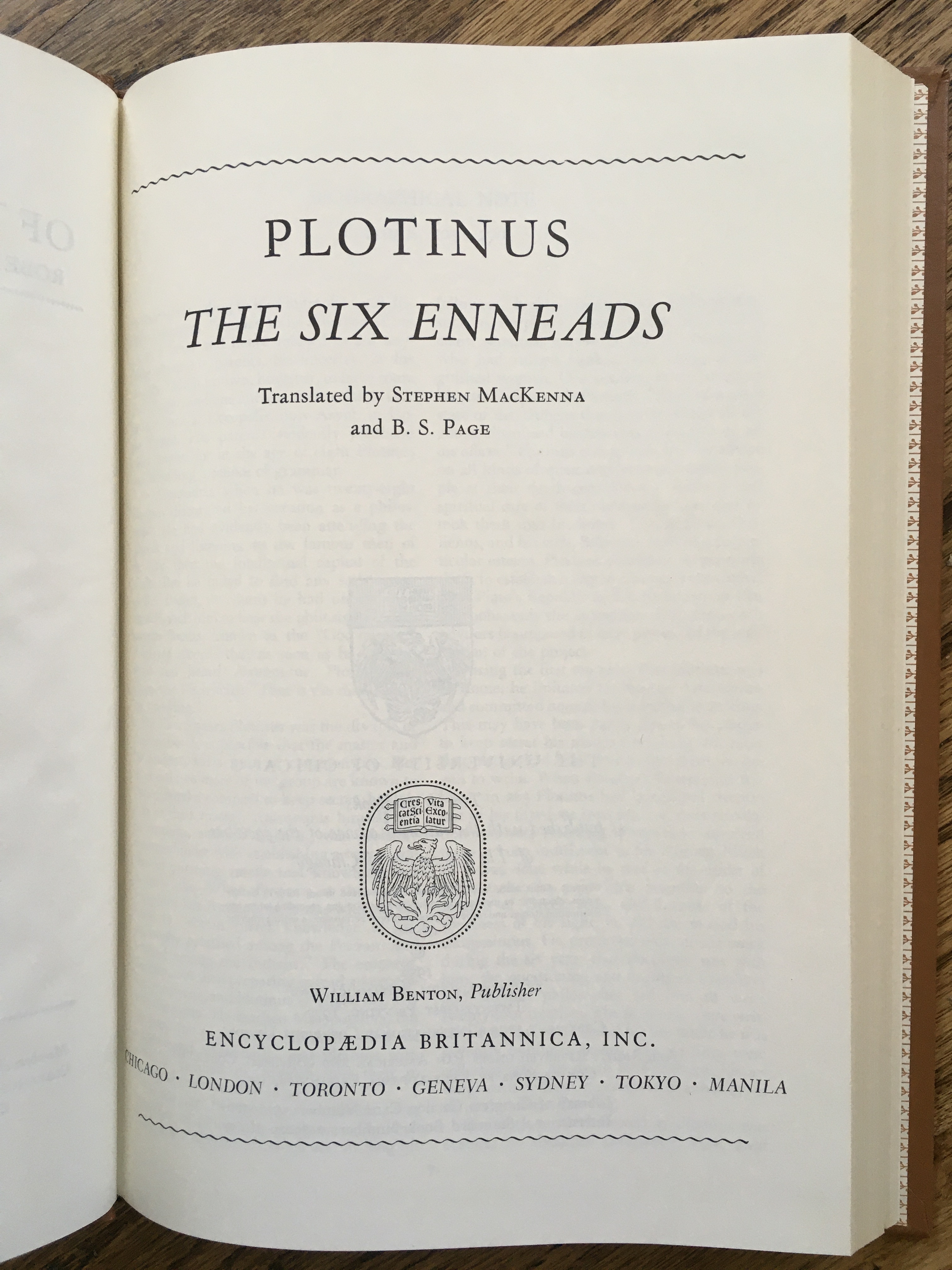
It's a 1977 reprint of Stephen MacKenna's celebrated translation of Plotinus, looking for all the world like it has never been opened before. My deity whispered, "you're welcome," in my ear, and I laughed so hard that I startled the poor shopkeeper.
It seems as if my course is made plain for me.
Geomancy Bird Parade
Apr. 1st, 2022 05:45 pmFor a couple years now, I have written my daily, monthly, and yearly geomancy readings on little squares of paper which have been folded to demarcate the houses:
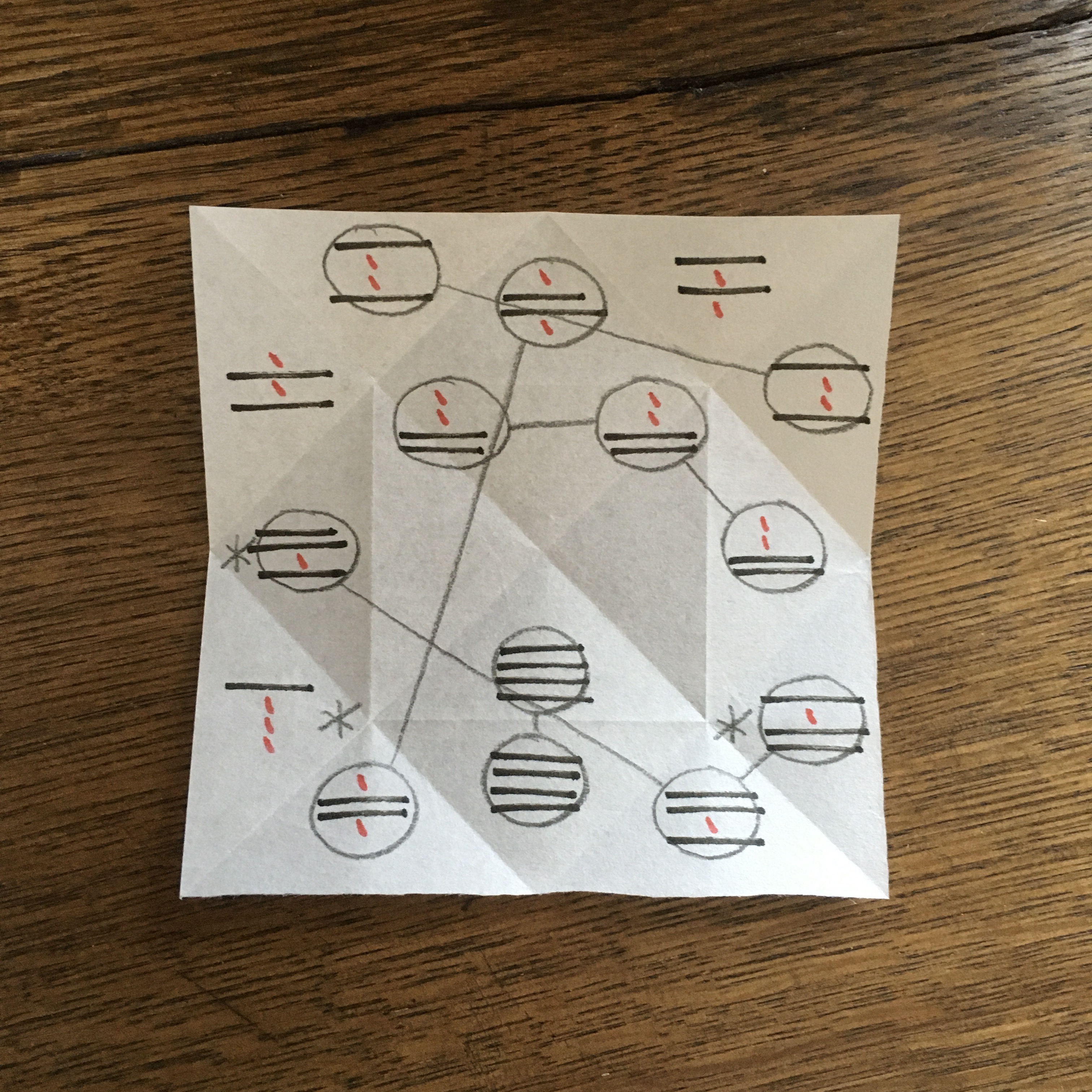
When my family left New York in a hurry last year, I destroyed all of the squares I had and switched to writing my readings in a diary; but once we moved in to our new house, I resumed folding my squares. I'm not really much for ritual, but I have long been fond of origami and I find the process of cutting and folding paper relaxing.
I realized, not so long ago, that the crease pattern in the paper is exactly that used for a traditional origami model—it doesn't have a widespread name in English, but in Spanish it is called a pajarita ("little bird") and in French it is called a cocotte ("hen"). (Personally, I think it looks like a sphinx, but my daughter says with a shrug, "It looks like a bird to me, daddy.")
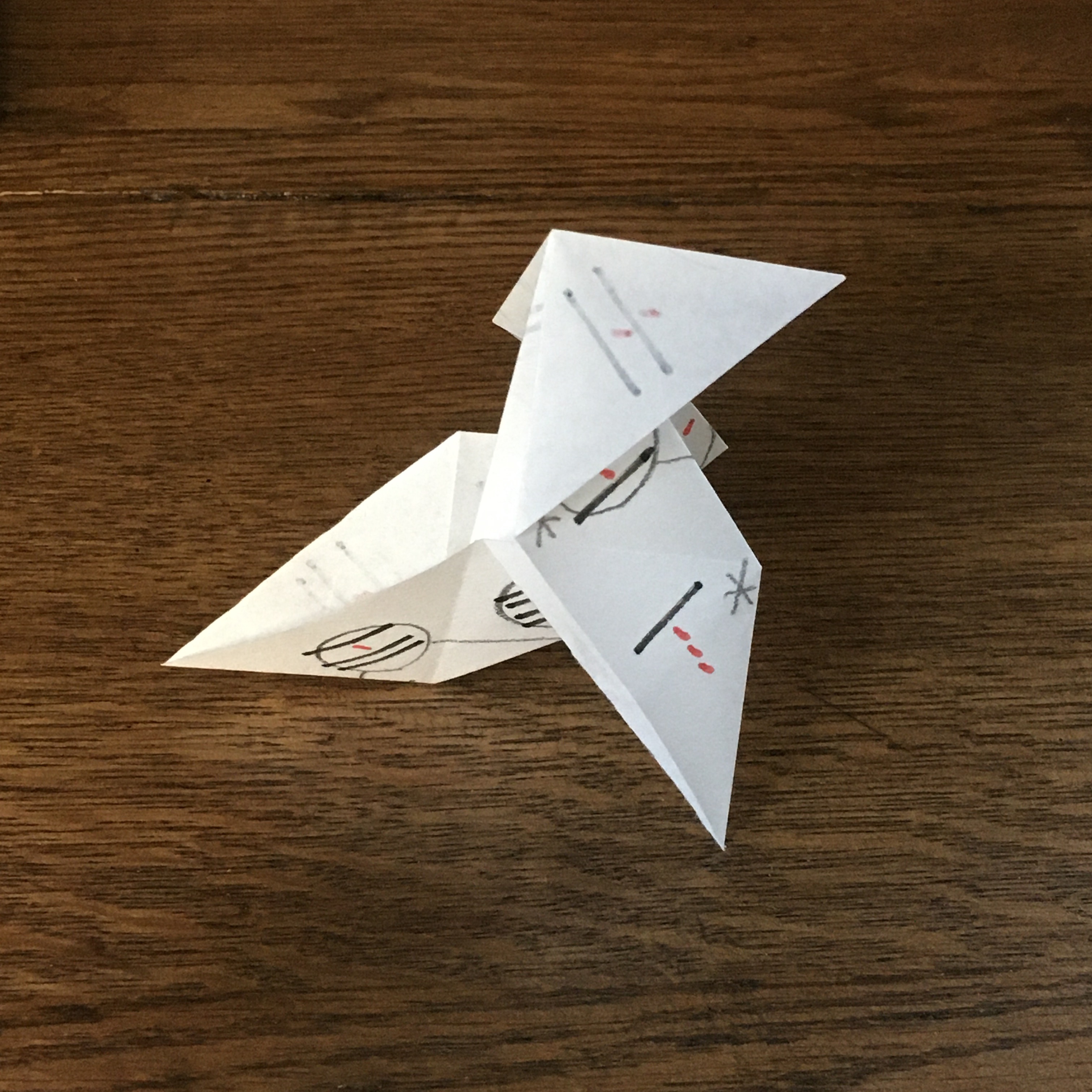
Because the crease pattern is the same, the readings naturally want to fold themselves into little birds, so recently I've been letting them. I tend to keep my yearly, monthly, and daily readings upon the altar in my office and return often to meditate upon them... for some reason, the readings seem to have more of a personality when they're bird-shaped.
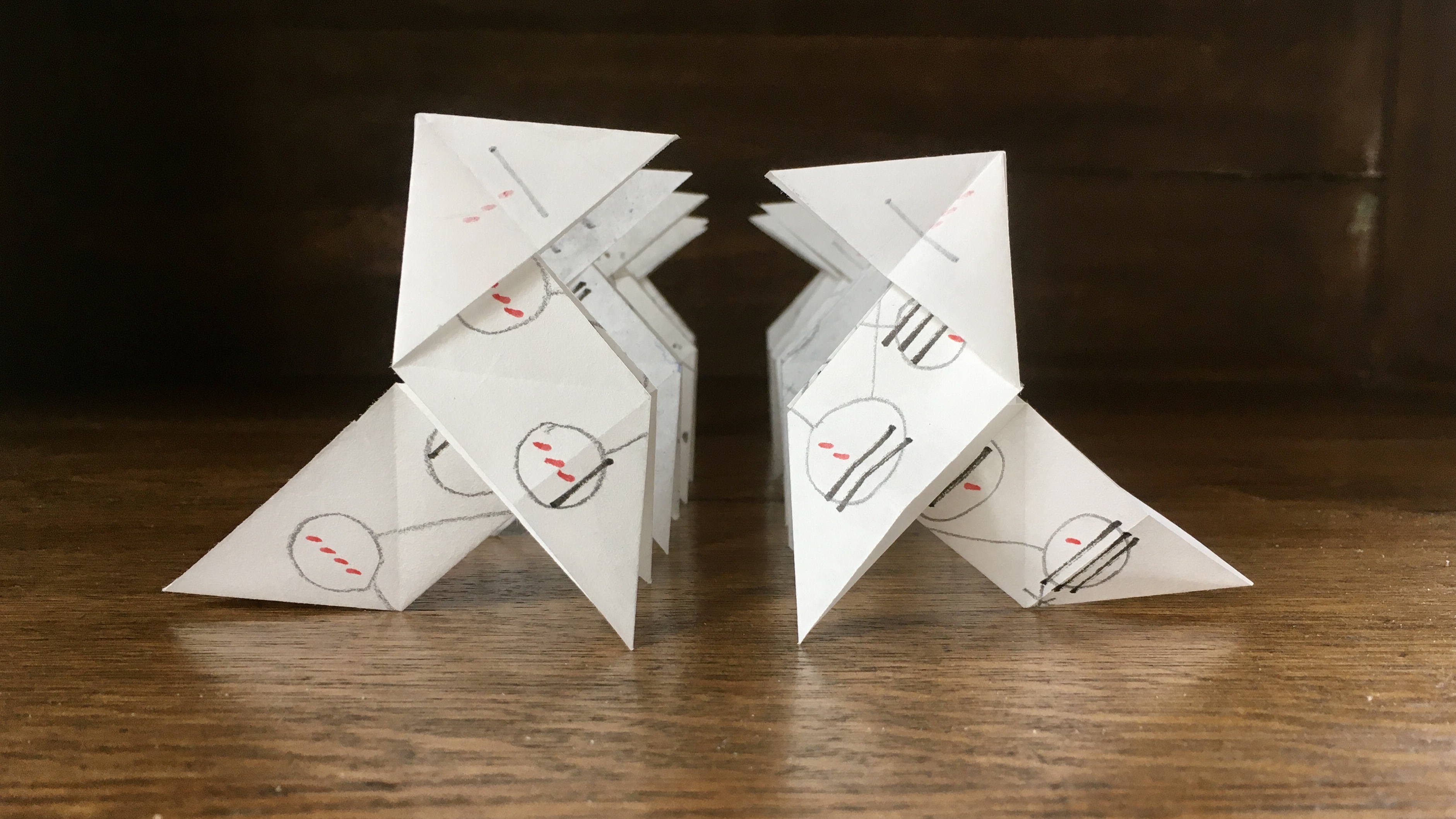
This week, I went through the stack I've been accruing all year and folded them all up. I've got a few hundred of them now, in all sorts of colors: a little avian army—air force?—carrying a year's dreams and experiences, crystallized.
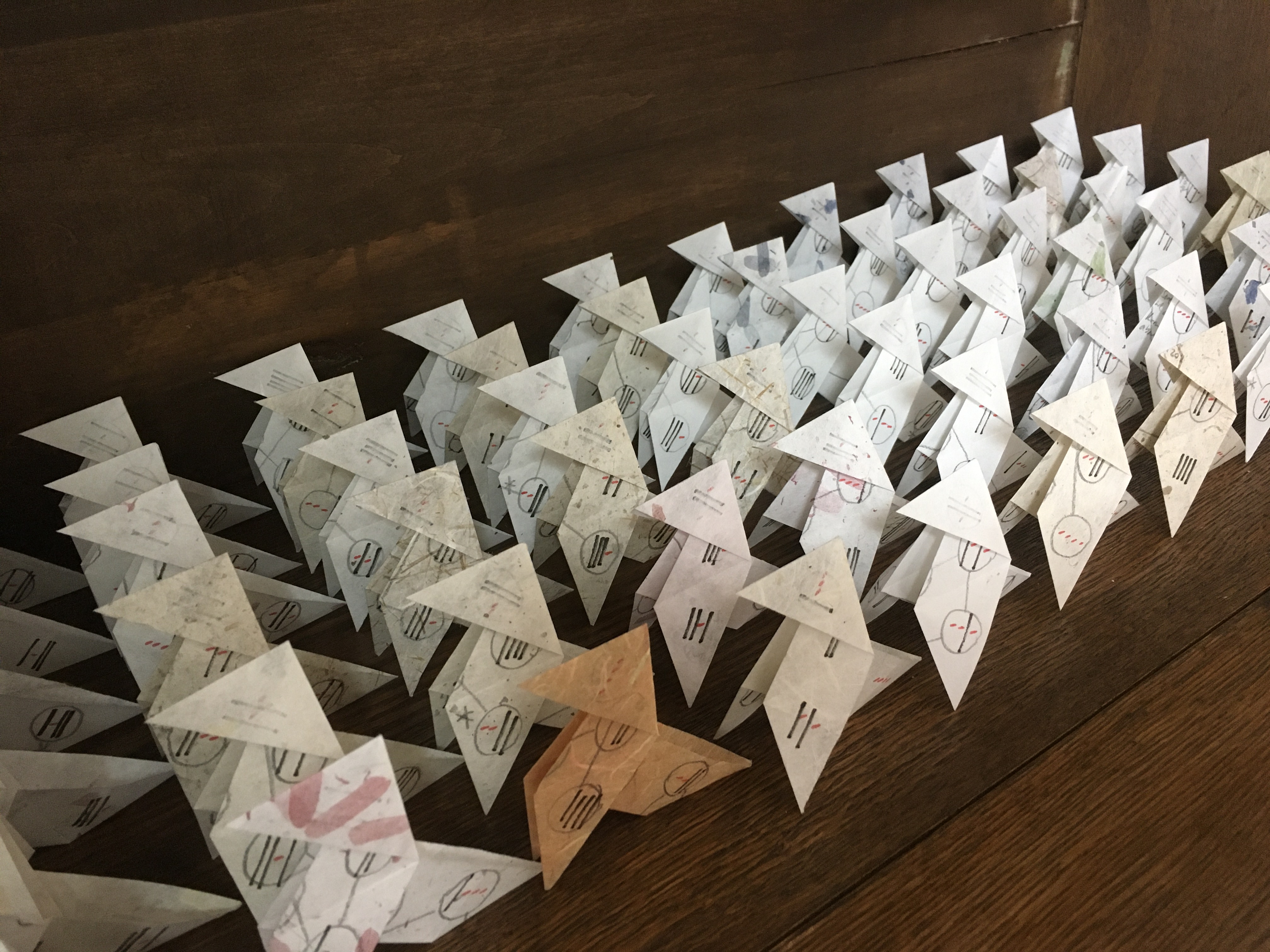
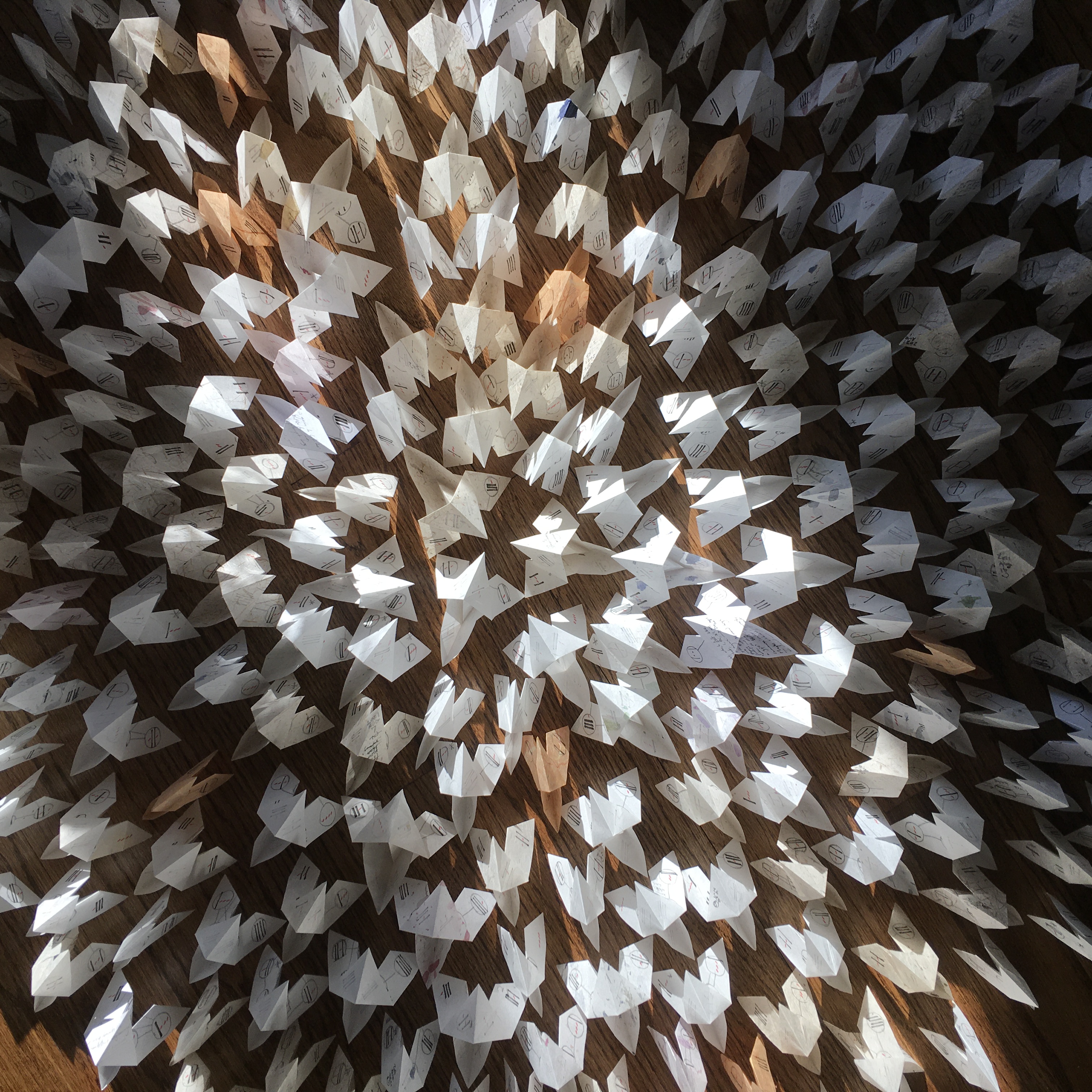
Let me excerpt an entry from my diary, dated Mar 2011:
While walking by my house today, there was a little leaf devil swirling in the road. I stepped past it, and it began to follow me, darting forward and back, playfully nipping at my heels. It spent ten minutes or so with me in this manner, all the way down the street: I leading, and it chasing. When I finally reached the end of the way and turned onto a side road to continue my walk, the leaf devil balked for a moment, spun in place, and finally whirled itself apart now that the game was over.
When I see such things with my own eyes, it is very difficult not to believe in magic.
I had completely forgotten about this lovely little incident, but was reminded of it by today's chapter of Sallustius, which speaks of circular motion being the imitation of Mind and linear motion being the imitation of Soul. We think very little of plain, old wind—but, for some reason, when the wind moves in circles, it seems intelligent, as my diary indicates!
So reminded, I thought I might ask if there was intelligence behind it, after all.
I'm Laetitia in the I, a figure of inspiration. The prospective spirit is Conjunctio in the VIII, the figure of forces coming together—and, I might note, a figure of Mercury, lord of intellect. Perfection exists through the translation (resolution by a third party, here Sallustius) of Fortuna Major (of success after long and patient effort) rejoicing in the IX (of philosophy) and in the XII (of blind spots). As a figure of the Sun, it's almost as if He's shedding light on the situation, and I would certainly say that taking ten years to make sense of an experience qualifies as long and patient effort!
The court takes a step back and looks at the bigger picture. At the time, I (Rubeus RW) was full of confusion and turmoil—I was just beginning, then, to take my first steps back into spirituality after harsh treatment at the hands of Christianity and materialism, both. This was soon to end (Cauda Draconis LW), but for the time being I was at a loss about the nature of the world (Amissio IV and J).
Puer in the III and XI seems to be my deity, winking and saying, "see how far I have led you?"
Every House has Many Meanings
Nov. 24th, 2021 04:03 pmWhen I first began geomancy, one of the big questions I routinely found myself asking was, "When I see a figure in house X, how do I know which association of house X it signifies?" The experience of the last few years has convinced me that the answer is, "All of them." Today's geomantic chart had a particularly elegant example of this, so I figured I'd take a few minutes to discuss it.
The thing to note here is Puer—a figure of Mars, denoting conflict—rejoicing in the sixth house (of material limitations and misfortune) and occupying the tenth (of things above one). This can mean many things, but you can always expect a powerful Mars in a bad house to mean trouble! Here are two things that it signified today:
- The friends my wife had invited over for a thanksgiving meal had to cancel, because a windstorm destroyed their chicken coop. As a material limitation, the sixth house can refer to domestic animals; as the sky is above, the tenth house can refer to weather; and the one attacking the other is Puer through and through.
- My wife had bought some smoked turkey from a local farmer for the holiday as an hors d'oeuvre. We've had quite a lot of this farmer's produce and know it to be safe for my autoimmune issues, but as it turned out I must have a problem with whatever wood was used to smoke it, since it gave me itchy hives all over my arms and especially my legs. Again, as a material limitation, one's body and disease are the sixth house; in medical geomancy, the tenth house refers to the knees and lower legs; and a self-hostile immune system has Puer running all through it.
Air and Water, Revisited
Oct. 8th, 2021 09:28 amSo I've been digging into why the significations for air and water vary between sources, especially on the topic of "intellect." Chris Brennan makes the point in Hellenistic Astrology that this is simply due to disagreements between Aristotle and his immediate successor, Theophrastus.
Aristotle saw fire as hot and water as cold, and thus in opposition to each other. Theophrastus, by contrast, saw air as cold and thus in opposition to fire. (He instead assigned water the quality of wet and placed it in opposition to dry earth.) Theophrastus' opinion influenced the Stoics, who in turn influenced the development of Hellenistic astrology: notice, for example, how the fire signs (Aries, Leo, Sagittarius) oppose the air signs (Libra, Aquarius, Gemini).
When astrology was revived in the medieval period, the associations stuck, but the interpretation of them was displaced by Aristotle's, who was held (alongside Ptolemy, who diverged from other Hellenistic astrologers) in high regard as being more "scientific" than other traditional thinkers. Consequently astrology (and to some degree geomancy, which flourished in the period and drew upon astrological symbolism) ended up chimæric, retaining the Stoic astrological associations but using the Aristotelian elemental symbolism.
I believe this fully accounts for my confusion with how air and water are interpreted.
The next question is which is correct? I don't think there's a simple answer to this, as the personal factor is too great to ignore. Whichever you choose, master it—but be aware that others may have chosen differently.
Relative Strength of Geomantic Joys
Sep. 28th, 2021 07:16 pmFrom a couple months of experimentation, it seems to me that some rejoicing figures are stronger than others:
- Albus appears to be stronger than Conjunctio.
- Populus appears to be stronger than Via.
- Puella appears to be stronger than Amissio.
- Rubeus appears to be stronger than Puer.
- Fortuna Major appears to be stronger than Fortuna Minor.
- Acquisitio appears to be stronger than Laetitia.
- Carcer appears to be stronger than Tristitia.
I suppose this is just saying that each planet's "forward" figure is stronger than it's "retrograde" figure, which makes sense. The odd one out here is Mars, though: Puer should, in theory, be stronger than Rubeus. But, in fact, Rubeus rejoicing is so strong it was the figure that first alerted me to the whole pattern, and has heralded my poor health multiple times a week since July...
EDIT 4 Oct 2021: Oh, um, Saturn is also the odd one out, as it's Tristitia that is Her "forward" figure, too...
I tend to spend a lot of time in prayer each day. I've been pretty sick for the last couple months, but I was feeling strong enough today that I decided to get out for a walk while I did my prayers today. About halfway in, a few dogs streamed in from all over the neighborhood I was in and started following me as if I was the Pied Piper of Hameln. I went on praying and as I wound down, the dogs trailed off one at a time until I was left alone by the time I reached home again.
What a strange experience! I've never had that happened before, and I wondered if there was a connection to my prayers, or if there was a more mundane explanation.
I'm passionate Rubeus in the first. Normally, this is a pretty bad sign, as it's an indicator that one isn't thinking clearly, or is even engaged in self-deception. In this case, though, I think it's simply showing that I was completely consumed in prayer, or perhaps, since Rubeus also occupies the fourth house (of private things), it indicates that my assumption that my prayers are private is quite mistaken! The quesited is shining Laetitia in the ninth house and occupying the third, indicating that yes, my prayers were in fact shining like a beacon for the neighborhood to see.
These perfect in three ways (which act as emphasis):
- Through the translation of Fortuna Minor in the second and tenth, indicating the intensity of my prayer.
- Through the translation of Populus in the eighth and twelfth, indicating receptive spiritual pathways.
- Through the mutation of Laetitia and Rubeus in the third and fourth, indicating the unexpected or surprising nature of the connection.
The dogs, as it happens, are masculine Puer in the sixth. (The largest dog, who was closest to me, was male, at least!) It is interesting that perfection also exists between me and the dogs, and between my prayer practice and the dogs, all facilitated through translations of receptive Populus.
I'm not clairvoyant, but this makes me wonder what the world looks like to one who is.